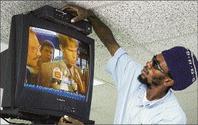Susan Gordon, Business Reporter 
Telstar employee Ian 'Birdie' Morgan is seen in this August 2003 file photo programming a cable box. Cable companies have more than doubled the price of the boxes to subscribers, citing a decline in the value of the dollar and a 25 per cent price increase by U.S. suppliers of the boxes. - File
Cable operators island-wide have increased the price charged to subscribers to rent their cable boxes.
Sunday Business understands that the increase, which has been incremental over the last few months due to the steady devaluation of the Jamaican dollar, was propped up last month when United States suppliers pushed up the price of boxes to its Caribbean market by some 25 per cent.
The average sale price of a box to subscribers up to July was $1,200. This included the cost of a remote controller.
Price hike last month
Last month, the price shot up as high as $2,900 among companies polled by Sunday Business.
Those subscribers who make deposits or purchase the boxes will face a loss of 70 per cent on the purchase price on return of the boxes as the cable operators are refunding less than one third of the payment.
Previously, a full $1,200 would be refunded, provided there were no arrears on an individual's account.
Kingston-based cable operators, contacted last week, confirmed that they faced increased costs.
"The prices of the boxes have gone up substantially and the devaluation of the dollar does not help," said Paulette Francis, director of Logic One Limited, which serves the Havendale, Stony Hill and Red Hills areas.
Francis said Logic One is paying about 20-25 per cent more for boxes.
Taneisha Darby, account executive at Telstar Cable Limited, said much of the added costs were linked to the dollar's slide.
"Instead of paying the programmer at a rate of US$65, we are now paying at US$70," she said.
The costs were passed on to subscribers.
Over the past few months, said Darby, the cost of the box with remote controller moved from $1,200 to $1,400 over the summer, before climbing to $2,800 last month.
Asked why the overseas suppliers had upped their prices, Francis said: "We asked and they said it was a matter of supply and demand."
There are very few companies in the U.S. supplying the boxes, making them part of a specialised market, she said.
"I know there are three (local cable) companies using the boxes we use, and the sources are the same," said Francis.
She would not divulge the names of the manufacturers.
Stephen Chung, managing director of Entertainment Systems Limited, concurred that the boxes were scarce. He said they were no longer used in the United States, leading to a cut in production.
"These boxes are just being used in the Caribbean, therefore, the production has been cut," said Chung, giving a reason for the supply and demand crisis.
He said, eventually, Jamaica's entire cable system is expected to go digital. The process still requires cable boxes, said Chung, but a newer version, like those now being used in the U.S.
Entertainment Systems' own timetable to go digital is 2008.
Telstar's Darby was careful to point out that cable boxes were issued to subscribers at cost.
"We don't make a profit on our boxes, but just to survive, we have to take a deposit," she told Sunday Business.
Darby expects the prices to continue to climb in the near term.
susan.gordon@gleanerjm.com

